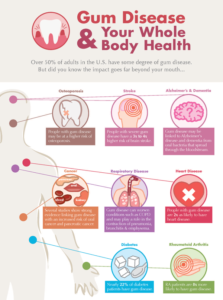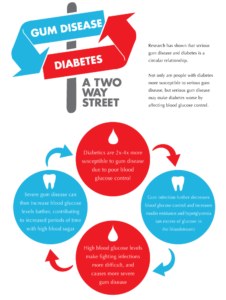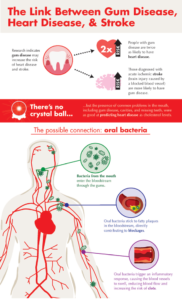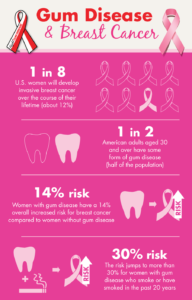Gum disease, or periodontal disease, affects millions of Americans. In a 2009-2010 study, researchers showed 64.1 million Americans aged 30 or older had gum disease. Additional research has shown links between gum disease and several other systemic illnesses, including heart disease, diabetes, and others.
Systemic disease is a term used to describe conditions that affect many organs and tissues. In other words, systemic diseases affect the whole body. If you have a systemic disease, it lowers your body’s ability to fight off infection and inflammation.
A growing body of evidence suggests inflammation could be the connection between systemic disease and gum disease, and, as a result, treating the inflammation could help manage both the conditions. However, while it is evident there is a relationship, there is no scientific evidence at this time to suggest a causal relationship between the two. The ADA explains that casual relationships are when two conditions might be related but are caused by a different factor. For example, smokers have a higher risk for developing a systemic condition like heart disease or gum disease than nonsmokers. However, heart disease does not cause gum disease – rather, both are caused by a different factor.
Systemic conditions with connections to oral health include diabetes, heart disease, stroke, and breast cancer, among others. Let’s take a closer look at each of these.
Diabetes
Research has shown that people with diabetes are more likely to develop severe gum disease and lose more teeth from it than people who don’t have diabetes. Also, gum disease could have adverse consequences on their ability to regulate glucose levels. It creates a circular relationship because the inability to control glucose levels provides an environment for the bacteria that cause gum disease (which thrive on sugars) to grow. Experts agree that controlling blood sugar levels decreases the risk of gum disease, as well as other complications from diabetes.
Heart Disease
Experts see a correlation between oral disease and heart function, although, like all the systemic conditions, it is not a causal relationship. Swelling links the two conditions. Hardened (swollen) arteries are a symptom of heart disease and decrease the flow of blood to your heart, which can lead to a heart attack or a stroke.
Swollen gums are a main symptom of gum disease. However, in the case of periodontitis, the gum infection develops below the gum line, a cause for concern for people with heart disease. Why? Because that bacteria can now travel throughout the body via the many vascular pathways in the mouth, including those that lead back to the heart. In other words, the more bacteria you have in your mouth, the more bacteria you could have in your heart. Experts agree that if you address your oral health, you may decrease the number of bacteria that could be present in your heart.
Stroke
Researchers in Germany found in a 2004 study that gum disease increased the risk of an ischemic stroke when the patient also had severe periodontitis, particularly for men and for subjects under 60 years of age. An ischemic stroke is a type of stroke caused by a blocked blood vessel the gets blood to the brain. As the relationship with heart disease, the link between gum disease and stroke is the inflammation present for both and the hardening of the arteries that results from it. Experts agree that by preventing gum disease, you decrease the risk factor for certain types of stroke.
Breast Cancer
Researchers at University of Buffalo’s School of Public Health found in a recent study that women who had gum disease had a 14% overall increased risk of breast cancer over women who didn’t have gum disease. The percentage jumps to over 30% if the woman smokes, or has smoked in the past 20 years. More research is needed to see if there is a connection between the inflammation gum disease causes and the development of breast cancer.
More scientific research is needed to determine if there is a cause-and-effect relationship between the systemic diseases and gum disease inflammation. It is clear by any measure, however, that gum disease isn’t helping the situation in any of these systemic conditions. There is a relationship between the gum disease and these diseases, even if it’s limited to the fact that people who have gum disease tend to have an unhealthy lifestyle that contributes to these conditions.
The good news is that moderate to severe periodontal disease is treatable. Traditional surgery has long been the only option. However, the FDA cleared the LANAP® protocol as a laser surgery option that facilitates a less painful, more successful treatment with a shorter recovery time. (For more information on the FDA-cleared LANAP® protocol, visit www.lanap.com.) If you currently suffer from one of these systemic conditions, ask your dentist if you are at risk for gum disease and what treatment is right for you.
Robert H. Gregg II, DDS is a co-developer of the PerioLase® MVP-7™ pulsed Nd:YAG laser and the LANAP protocol. Dr. Gregg is a co-founder of Millennium Dental Technologies, Inc. and is the Program Director of the Institute for Advanced Laser Dentistry. Recognized as one of the top 250 Leaders in Dental Education by Dentistry Today for 2009-2012, he is a peer-review member of the Dentistry Today CE Editorial Board. He maintains a private practice in Cerritos, California.
Sources:
Peke, P. I., et al. “Prevalence of Periodontis in Adults in the United States: 2009 2010.” Journal of Dental Research 91.10 (2012): 914-20. Prevalence of Periodontitis in Adults in the United States: 2009 and 2010. Sage Journals, 30 Aug. 2012. Web. 22 Apr. 2016.
“Periodontal Disease and Systemic Health.” www.perio.org. Web. 22 April 2016. < https://www.perio.org/consumer/other-diseases>
“Oral Health Topics.” www.ada.org. Web. 22 April 2016. < http://www.ada.org/en/member-center/oral-health-topics/oral-systemic-health>
“Diabetes and Periodontal Disease.” www.webmd.com. Web. 24 April 2016. < http://www.webmd.com/diabetes/periodontal-disease>
Miller, Kelli. “Periodontal Disease and Heart Health.” www.webmd.com. Web. 24 April 2016. < http://www.webmd.com/heart-disease/features/periodontal-disease-heart-health>
Grau, MD, Armin J.; Becher, PhD, Heiko; Christoph M. Siegler, M.D., et al. “Periodontal Disease as a Risk Factor for Ischemic Stroke.” Stroke (2004) 35: 496-501. Web Stroke.ahajournals.org. <http://stroke.ahajournals.org/content/35/2/496.full>
Reinberg, Steven. “Link Between Gum Disease, Breast Cancer Risk?” www.webmd.com. Web. 24 April 2016. <http://www.webmd.com/breast-cancer/news/20151221/study-suggests-link-between-gum-disease-breast-cancer-risk>






Leave a Reply